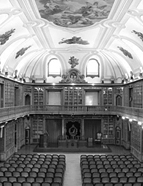

However, the collective effort to enquire into private, local, and regional civil and ecclesiastical archives, attempted between 1788-1795, and particularly the continued production of historical texts, such as those that still arouse vivid interest with in the academic community today (in the case of the Memórias de Literatura), had ceased to be possible for several reasons. One such reason was the almost constant political and military instability between 1820 and 1851. Another was the diminishing role of patronage, on the part of the king, the royal family, and the president of the ACL (by virtue of the position, a prince of royal blood), in light of civil dissensions such as those that occurred during the reigns of King João VI, King Pedro IV, and King Miguel I: the sovereign could no longer act as the institution’s protector and financier during the years of civil war, financial and economic crises, and the politicisation of public debate—whether political and historical or academic and intellectual. Vintism, the first Portuguese liberal experiment, appeared to view unfavourably the existence and funding of such a cultural institution, so clearly associated with the Ancien Régime and with an aristocratic, elitist concept of an academic body. This contrasted with other cultural and civic bodies, such as the University of Coimbra, Lisbon's political clubs, and cultural associations of various kinds. This interpretation is confirmed by the session of the Sovereign Congress on 9 January 1823, when parliamentarians João Vitorino and João Maria Soares Castelo Branco stated that "all academic establishments had been born under the breath and protection of absolute power, to which the members, more than anyone else, burned incense" and that "the scholars of the academies were the foremost promoters of this same despotism" (Luís R. Torgal and Isabel N. Vargues, A Revolução de 1820 e a Instrução Pública [The Revolution of 1820 and Public Instruction] 1984, pp. 233 and 242). Lastly, the absence of a permanent headquarters for the ACL until 1833 and its constant relocation could not positively contribute to the stabilisation of historical work or the establishment of a documenta l and bibliographic collection to support continued historical research. It is evident that the irregularity of collective publications of a historical nature and the constant changes in the nature of the collective titles printed by the Academy would make it difficult to produce the kind of innovative and progressive historical and methodological work that had occurred in 1789-1814. The times of revolution, regeneration, and liberal implementation would not permit it, with other cultural and scientific priorities asserting themselves, both politically and culturally.
